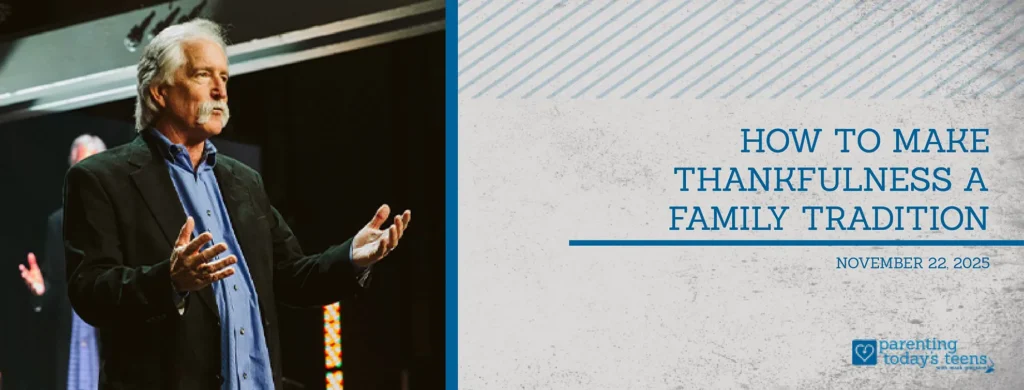When I look at the influencers in my life, most of the time, I don’t remember a word they’ve said. But what I can remember is the example they set. And that’s what I see fleshed out over and over again in Scripture. When Paul wrote to the Corinthians, he said, “Remember how I was with you,” and there’s something very powerful about our “witness” being wrapped up in our “with-ness.”
The Reality of Changing Times
Most parents overestimate the value of their words and underestimate the effectiveness of their actions. They think if they just talk more, then their teens will listen. But teens are moving from the teaching mode of words to the training mode where they want to see a life lived out in practical ways each day.
Every Christian parent wants their teen to develop a life of faith of their own. But sometimes parents and grandparents get drowned out by all the noise. There’s so much information out there online! Plus the concept of authority has also changed the way teens evaluate which ideas they will listen to. They don’t automatically trust the adults to tell the truth. At the same time, there are countless voices trying to get their attention. As a result, they’re not getting what they would have normally gotten years ago—the reliable wisdom of their parents and grandparents.
During the teen years, your teen is moving from concrete thinking to abstract thinking. This is what happens when a teen begins to say, “I don’t know if abortion is wrong.” Or “I don’t know whether Jesus is really the Son of God.” The mistake some parents make is becoming very judgmental. How you react in these moments can teach your teen more than just your words alone.
The Choice Every Parent Faces
As a parent, you can choose whether you want to be a part of the process to help teens learn and sort through what’s right or wrong, or whether you want to shut them down and not let them think on their own. If that’s the way you want to go, then your teen is likely to eliminate everything you’ve taught them because they’re going to say, “I’ll figure it out on my own without your help.” Or they’ll get the information from someone else, and that may lead them down a road they do not want to travel.
It’s easy to overreact and panic when a statement like “I don’t know if God is real” is brought up, or a tough question is expressed. But we have to let our teens explore. Why? Because God is still God. Just because your teen is questioning their faith doesn’t mean you didn’t do your job well. God is still God, and He’s capable to bring to fruition the seeds that have been sown into your teen’s life. God can complete the good work He’s begun in you and your teen.
Personally, I like it when teens question things because ultimately it causes them to be a little bit more firm in their faith. I like when they start asking the hard questions that may not have easy answers. Then, they’ll begin to understand that there are some answers you have to wait on, or spend a lifetime trying to figure out.
Being Intentional Without Being Judgmental
It can sometimes be hard to overcome our natural tendency to overreact. I tell parents this all the time: If you want your teen to shut you down, just be judgmental.
I was the Oklahoma Bible Quiz Champ of 1969, and I believe every scripture I read. But the challenge is taking the scripture I know to be true and helping somebody else apply it to the world they live in and their perception of the world. It doesn’t take away from me, but I’ve got to do it in such a way that I’m not just passing judgment. The culture is so volatile right now, the minute teens hear the word “judgment” or feel judged, they will shut you down in a heartbeat.
So, what does that mean?
It means parents need to be very careful about how they come across to their teens. I’ve heard parents say, “As long as you’re in my home, you’re going to go to church.” But I’ve found that if I give teens the option to go to church, at an appropriate age (16, 17, when they can drive) that gives them the opportunity to start making choices, start making decisions, start thinking about spiritual things so they’re choosing to be a part of something, rather than having it pushed on them.
How to Nurture Your Teen’s Faith
So, how do we live out our faith in front of our teens?
First, be open about your faith. But not in a flashy way. I don’t have a Jesus tattoo. I don’t carry a big Bible around with a cross around my neck, and I don’t put a little fish on my car. But I do talk about my relationship with Christ when life happens. If they want to talk about loss, difficulties, struggles, hardship, grace, forgiveness, or what it means to move toward somebody when you have every right to move the other way, then I want to listen. I want to create a world that is restful for them, where we can have discussions about anything. But I’ll never have the opportunity to speak to them unless I have a relationship with them first that provides the platform for those discussions. Mom and dad, make the atmosphere of your home a place where tough topics are welcome and no questions are off limits.
Next, pray for your teens all the time, and if the opportunities arise, pray with them. I pray for my kids all the time. It’s not limited to mealtime when I’m getting ready to eat. It’s honestly praying, “God, intervene in this situation. Make the opportunities happen. Give me the opportunity to not only share my faith but show them my faith.”
The Bottom Line
Don’t overestimate the value of your words and underestimate the effectiveness of your actions. Don’t think that if you just talk more, then your teens will listen. Rather, embrace the understanding that teens pick up more in what they see than what they hear.
Many teens can’t hear a word their parents are saying, because their actions are speaking too loudly. If your actions don’t match your words, your teens won’t buy what you are selling. There must be consistency in the words you speak and the actions that they see. It’s called integrity, and it’s this integrity that sets an expectation of saying, “Don’t just talk like me; be like me.” Don’t just talk the talk; be intentional in how you walk the walk, because your “with-ness” is your most effective “witness.”






